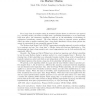Free Online Productivity Tools
i2Speak
i2Symbol
i2OCR
iTex2Img
iWeb2Print
iWeb2Shot
i2Type
iPdf2Split
iPdf2Merge
i2Bopomofo
i2Arabic
i2Style
i2Image
i2PDF
iLatex2Rtf
Sci2ools
111
click to vote
STOC
1997
ACM
1997
ACM
An Interruptible Algorithm for Perfect Sampling via Markov Chains
For a large class of examples arising in statistical physics known as attractive spin systems (e.g., the Ising model), one seeks to sample from a probability distribution π on an enormously large state space, but elementary sampling is ruled out by the infeasibility of calculating an appropriate normalizing constant. The same difficulty arises in computer science problems where one seeks to sample randomly from a large finite distributive lattice whose precise size cannot be ascertained in any reasonable amount of time. The Markov chain Monte Carlo (MCMC) approximate sampling approach to such a problem is to construct and run “for a long time” a Markov chain with long-run distribution π. But determining how long is long enough to get a good approximation can be both analytically and empirically difficult. Recently, Jim Propp and David Wilson have devised an ingenious and efficient algorithm to use the same Markov chains to produce perfect (i.e., exact) samples from π. However,...
Related Content
| Added | 07 Aug 2010 |
| Updated | 07 Aug 2010 |
| Type | Conference |
| Year | 1997 |
| Where | STOC |
| Authors | James Allen Fill |
Comments (0)

